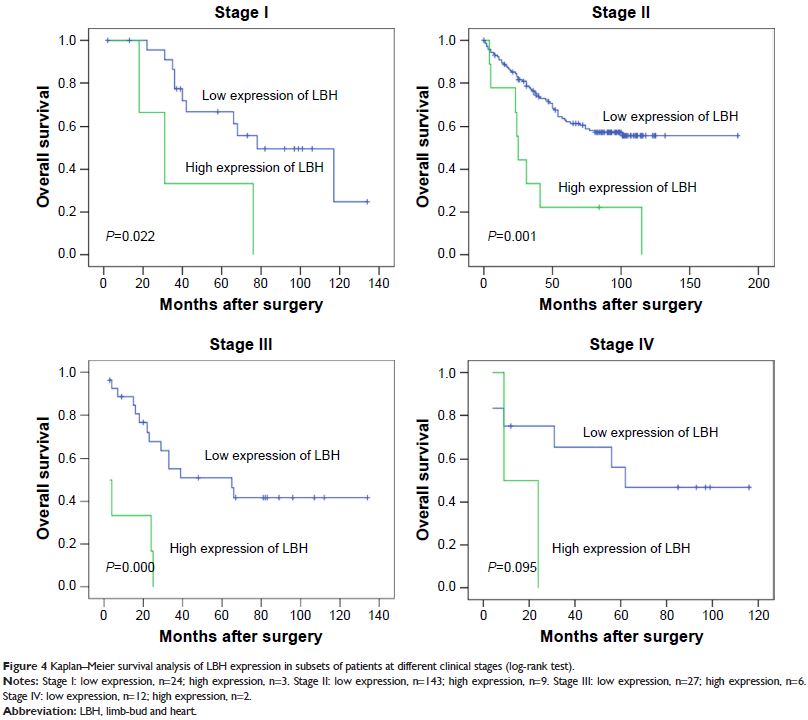108985
论文已发表
注册即可获取德孚的最新动态
IF 收录期刊
- 3.4 Breast Cancer (Dove Med Press)
- 3.2 Clin Epidemiol
- 2.6 Cancer Manag Res
- 2.9 Infect Drug Resist
- 3.7 Clin Interv Aging
- 5.1 Drug Des Dev Ther
- 3.1 Int J Chronic Obstr
- 6.6 Int J Nanomed
- 2.6 Int J Women's Health
- 2.9 Neuropsych Dis Treat
- 2.8 OncoTargets Ther
- 2.0 Patient Prefer Adher
- 2.2 Ther Clin Risk Manag
- 2.5 J Pain Res
- 3.0 Diabet Metab Synd Ob
- 3.2 Psychol Res Behav Ma
- 3.4 Nat Sci Sleep
- 1.8 Pharmgenomics Pers Med
- 2.0 Risk Manag Healthc Policy
- 4.1 J Inflamm Res
- 2.0 Int J Gen Med
- 3.4 J Hepatocell Carcinoma
- 3.0 J Asthma Allergy
- 2.2 Clin Cosmet Investig Dermatol
- 2.4 J Multidiscip Healthc

LBH 的过度表达与人肝细胞癌预后不良有关
Authors Chen JW, Huang CQ, Chen K, Li SM, Zhang X, Cheng J, Cai MY, Xiao Y
Received 30 September 2017
Accepted for publication 3 December 2017
Published 19 January 2018 Volume 2018:11 Pages 441—448
DOI https://doi.org/10.2147/OTT.S152953
Checked for plagiarism Yes
Review by Single-blind
Peer reviewers approved by Dr Amy Norman
Peer reviewer comments 3
Editor who approved publication: Prof. Dr. Geoffrey Pietersz
Purpose: Limb-bud
and heart (LBH) levels are correlated with adverse survival in several
malignancies; however, their significance in hepatocellular carcinoma (HCC)
remains unclear. The objective of this study was to determine the association
between LBH status and clinical outcomes.
Methods: We selected 226 patients with HCC who were treated surgically between
2003 and 2010 at a single academic center. Immunohistochemistry (IHC) was used
to detect the protein expression of LBH in HCC samples. Receiver operating
characteristic (ROC) curve analysis, Spearman’s rank correlation, Kaplan–Meier
plots, and the Cox proportional hazards regression model were used to analyze
the data.
Results: A high expression of LBH was detected in 20 (8.8%) of 226 HCC
samples. Correlation analysis demonstrated that LBH in HCC was significantly
correlated with aspartate aminotransferase (AST)/alanine aminotransferase
(ALT) levels and clinical stages (P <0.05). In the
Kaplan–Meier analysis, the mean survival time of patients with low levels of
LBH was longer than that for those with high levels of LBH (P <0.05). The 3-year overall
survival rate was 20% for patients with HCC and high levels of LBH versus 67%
for patients with HCC and low levels of LBH. In the multivariate analysis,
AST/ALT level, clinical stage, tumor relapse, and the level of LBH were the
independent prognostic factors for overall survival (P <0.05).
Conclusion: Overexpression of LBH might contribute to the development and
progression of HCC. LBH could be a novel prognostic marker for HCC.
Keywords: LBH, hepatocellular carcinoma, immunohistochemistry, prognosis
